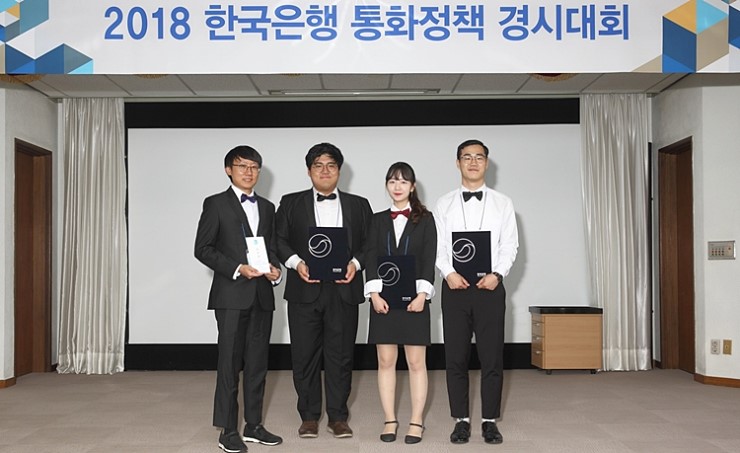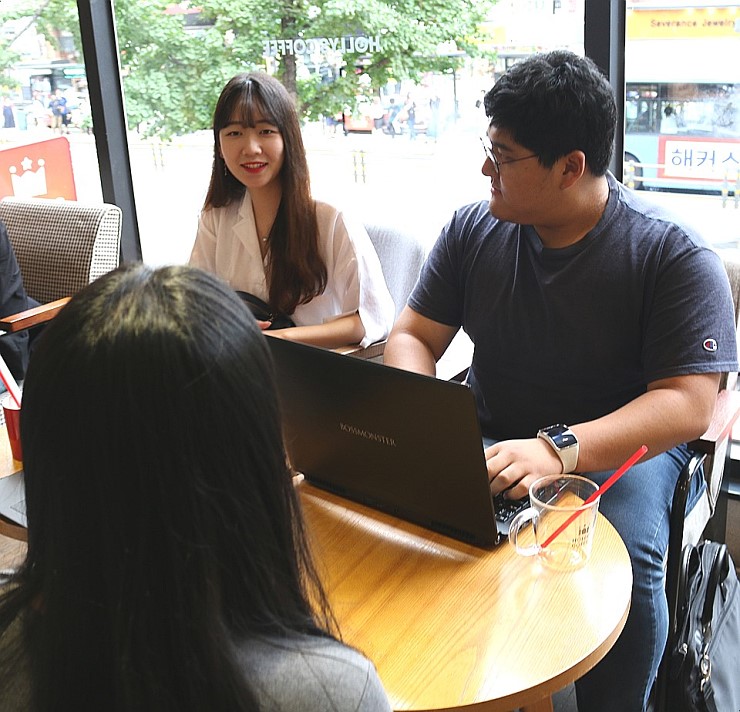Dankook University’s student team ‘Sommelier’ won the award for excellence on July 25th in the 2018 Monetary Policy Competition hosted by the Central Bank of Korea. Cho Hea-bin (Business Administration major) and Lee Hun-woo (Business Administration major) won the contest that pits college students against one another in an attempt to develop their own hypothetical monetary policies. The Dankook Herald (DKH) interviewed Lee and Cho to learn more about their experience.
 |
| ▲ Dankookian(students of Dankook University)’s team ‘Sommelier’ won the prize excellence award on July25th in the 2018 Monetary Policy competition held by the Bank of Korea (CentralBank of Korea). |
Q: What motivated you to participate in this competition?
Lee hun-woo: We first met through the debating club Bam-tori and decided to participate in this competition. First, our motivation was studying about the economy. And after we studied, we wanted to test our level through this competition. We had to gather 4 team members to participate, but it was hard to find 2 more at DKU. We later recruited the others from Lee’s other outside activity ‘Finance Press Corps’.
Q: In the competition, you advocated freezing the standard interest rate, based on a 52 hour work week. Can you explain this concept?
Lee Hun-woo: One of the biggest factors to consider when setting the standard interest rate is inflation. If inflation is high, we must increase the standard interest rate. However currently, Korea’s inflation rate is between 1.5%, and 1.2%, except for products that experience high price fluctuations like oil and agricultural products. Moreover, our current economy is not good. Therefore a 52 hour work week or higher minimum wages rate could have negative affects on Korea’s real economy. For these reasons we suggested freezing the standard interest rate. In this competition, half of the groups suggested freezing the standard interest rate and the other argued in favor of increasing it.
Q: You’re studying business administration, so was it difficult to research professional economic knowledge. What was your most significant challenge and how did you overcome it?
Cho Hea-bin: I’ve always had interest in economics, but I only studied it for Korean SATs or for my own knowledge from textbooks. At first, I participated in the competition to learn more about economics, but as the competition went on, it was clear you needed to have a certain level of economic knowledge and that was very challenging for me. However, my teammates helped me a lot so we could finish the competition well. They were patient in explaining economic terms and various economic phenomena. That is why I am grateful to our teammates.
Lee Hun-woo: I liked economics from high school. Before I started this competition, I had a great degree of confidence in my knowledge of economics. However, when I adapted theory to real life, there were so many variables that could not be answered using standard textbooks. Therefore, I had to read many books to better understand how and why it works as it does. In the end, I did well on the phenomenon analysis. During the competition, I sent an email to professor Shin dong-ryeong and his response helped me decide on the direction we needed to take. Knowing that the professor is very busy and still had the time and passion to help us, encouraged us to dedicate ourselves more to the competition.
Q: What did you gain from this competition?
Cho Hea-bin: Like I stated before, I only had knowledge of the theoretic parts. As I participated in this competition, I learned how the economy actually works. Moreover, I used to take in whatever was going on in the news passively, but after this test, I check figures and compare different media sources to pursue a more critical attitude of what we are being told. Another thing is after the test, I realized how insufficient my knowledge of economics was, giving me a stronger urge to study even harder than before.
Lee Hun-woo: First, I was able to meet other people who did this competition and form a team called “Gyeong Jjin Hoe.” “Gyeong Jjin Hoe” means a meeting of people who try to study the economy in depth. Second, before the competition, I was proud of my economic knowledge, but now I feel that I still have many things to study. Moreover, after the contest, I feel more sensitive to real economy news. For example, I used to accept economic news without active fact-checking by myself, but now I look the actual figures and analyze the situation. One of my bucket list items was to work on this competition and I am happy to have achieved it.
 |
| ▲ The 'Sommelier' team member Lee Hun-woo and member Cho Hea-bin are interviewing with the Dankook Herald. |
Q: What are your future plans or goals?
Lee Hun-woo: Now my goal is going to law school. If I become a public prosecutor, I want to take responsibility for economic issues. I also want to work at the Bank of Korea or study economic law. Cho Hea-bin: I am also interested in many areas. I took part in an engineering competition and I am also interested in diplomacy. I am trying to find my true interests by participating in various activities in my 1st and 2nd year of university. This competition was half of my plan. I love economics as much as diplomacy, so I haven’t decided on my dream job yet. Now, I’m planning to be an exchange student for a year.
Cho and Lee emphasized that for Dankookians (students of Dankook) who want to prepare for this competition, they must study phenomenon analysis. There is no one size fits all answer and the analysis is infinite despite the being the same phenomenon. Experts analysis isn’t an unconditional answer, so they should perform their own analysis using their own clear beliefs backed by valid and justifiable reasons. To get to these reasons, you should keep asking yourself ‘why?’. Asking these questions and solving the problems are the best way to prepare yourself for this competition. Making a strong argument and backing it with knowledge is key to developing and supporting your main opinion.
심형석, 정유진, 신지희 dankookherald@gmail.com

![[Campus Magnifier] Let's Surf the Library!](/news/photo/202404/12496_1765_4143.jpg) [Campus Magnifier] Let's Surf the Library!
[Campus Magnifier] Let's Surf the Library!
![[Campus Magnifier] Let's Surf the Library!](/news/thumbnail/202404/12496_1765_4143_v150.jpg)





